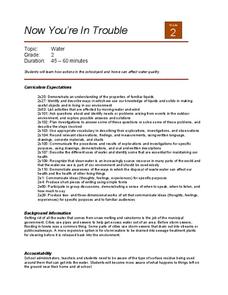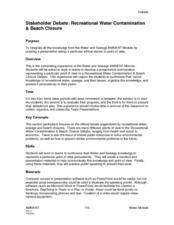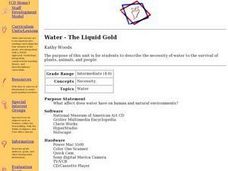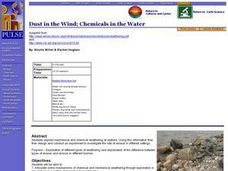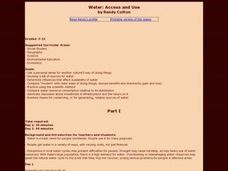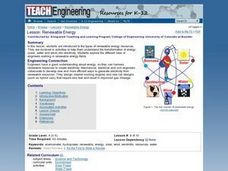Curated OER
Now You're In Trouble
Second graders study how actions in the schoolyard and home can affect water quality. They discuss how rainwater can clean plants and sidewalks on its way to storm sewers. They draw an example of a simple maze that represents the maze...
Curated OER
Stream Ecology In Wisconsin and Puerto Rico
Students identify the different types of water and explain in what proportions they exist on Earth. They identify and correctly label the parts of the water cycle and how these parts interact with each other. Students identify the...
Curated OER
Well, Well, Well
Young scholars consider a case of potential water contamination by using a process of reasoned discourse about the definition of the problem, the relevant information, and the values behind different solutions. They consider the role of...
Curated OER
Water Microbes and Human Health
Students research the possible sources and human health effects of microbes found in recreational and drinking water. They explore the range of negative outcomes of contact with contaminated recreational and drinking water by creating...
Curated OER
Water and Sewage Critical reading
Students read three articles with different points of view on the water and sanitation issues in the Florida Keys. They identify the facts and opinions in each article and write a summary. In addition, they write an essay expressing...
Curated OER
Water Creative Writing
Learners red and discuss an example of a biographical essay. They read The Last of the Falling Tide by Car Hiassen, answer factual questions concerning the work, and create their own story about a natural place they are familiar with ,...
Curated OER
Recreational Water Contamination and Beach Closurew
Students work in teams to develop a presentation and handout representing a particular point of view in a recreational Water Contaminationand Beach Closure Debate. They synthesize their knowledge of recreational water, sewage, and their...
Curated OER
Sea-ing More Clearly
Students explore historical importance of fish as food source, examine works of Robert Harris, create their own fish, and compose accompanying poetry. Students then explore dramatic tradition of Chorus inspired by Greek theatre,...
Curated OER
Water
Students learn about the history of Indiana's water and understand how easily pollution can contaminate the water supply. They also learn how little fresh water we have and how important it is to protect it.
Curated OER
Water, Water Everywhere (Pond Animals)
Second graders examine the characteristics of animals who live in a pond environment. In groups, they describe the various stages in the life of a frog and identify the characteristics of other pond animals. Using this information,...
Curated OER
Healthy Living: Multicultural Awareness and Appreciation Adaptation
Students recognize a globe and distinguish between land and water, as well as recognize different cultures. They become knowledgeable regarding geography and cultural diversity.
Curated OER
Erosion Lab
Eighth graders explore variables that influence the rate of erosion due to the 4 major agents. They work as a group and practice conducting experiments according to the scientific method. Students comprehend that communicating ideas...
Curated OER
Water-The Liquid Gold
Students investigate the necessity of water for the survival of plants, animals, and people. They explore the affect that water has on human and natural environments through literature, field trips, and discussions.
Curated OER
Dust in the Wind; Chemicals in the Water
Students explore mechanical and chemical weathering at stations. They articulate some mechanisms of chemical and mechanical weathering through exploration in a lab. Students stations describe how chemical weathering differs from...
Curated OER
Water: Access and Use
Young scholars get a personal sense for another culture's way of doing things. Develop a list of sources for water. Practice using the scientific method. Examine means for conserving, or for generating, reliable sources of water.
Curated OER
Oil Spill
Young scholars explore an important role of environmental engineers by studying the Exxon Valdez oil spill. They experiment with different strategies in order to clean up their own manufactured oil spill.
Curated OER
TE Activity: Oil Spill Cleanup
Students experiment by creating an oil spill and trying a number of clean up methods. They determine which methods are the least costly and most effective. They role play as an environmental engineer and as an oil company owner who must...
Curated OER
TE Lesson: Renewable Energy
Young scholars examine renewable energy sources such as solar, water, and wind. They experiment to determine how renewable energy is transformed into electricity. They investigate the role of engineers who work in the field of renewable...
Curated OER
TE Lesson: What to Wear? What to Drink? Weather Patterns and Climatic Regions
Students examine how climate affects lifestyle, clothing choices, food, and water sources. They explore climatic regions such as tropical, desert, coastal, and alpine situations. They look at the longitude and latitude, land features and...
Curated OER
Letting Off Steam
Learners examine the concept of transpiration. They work together to complete an experiment in which they see water loss in plants. They record their observations and discuss their conclusions.
Curated OER
Critter Clues
Young scholars work together to examine water quality. They identify the indicators of water quality and complete an experiment. They discuss their results.
Curated OER
Kure Waste Chase Game Lesson
Students work together to identify marine debris. They explain the effect of the debris on various ecosystems. They draw different types of ocean currents as well.
Curated OER
Is There Water on Mars?
Students decide whether or not there is or has even been water on Mars. They analyze temperature and pressure data from the Pathfinder mission to Mars, and then they analyze images of Mars, interpreting the landforms they see and...
Curated OER
Box Cars Math Games
Students grow vegetable sections without soil, using water and pebbles or small rocks. They explain different ways that plants grow and grow vegetable sections using water and small rocks.


